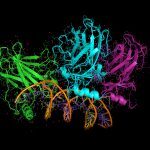Lien vers Pubmed [PMID] – 28156048
Lien DOI – 10.1002/1878-0261.12035
Mol Oncol 2017 Aug; 11(8): 895-912
Bladder carcinogenesis and tumour progression is accompanied by profound alterations in protein glycosylation on the cell surface, which may be explored for improving disease management. In a search for prognosis biomarkers and novel therapeutic targets we have screened, using immunohistochemistry, a series of bladder tumours with differing clinicopathology for short-chain O-glycans commonly found in glycoproteins of human solid tumours. These included the Tn and T antigens and their sialylated counterparts sialyl-Tn(STn) and sialyl-T(ST), which are generally associated with poor prognosis. We have also explored the nature of T antigen sialylation, namely the sialyl-3-T(S3T) and sialyl-6-T(S6T) sialoforms, based on combinations of enzymatic treatments. We observed a predominance of sialoglycans over neutral glycoforms (Tn and T antigens) in bladder tumours. In particular, the STn antigen was associated with high-grade disease and muscle invasion, in accordance with our previous observations. The S3T and S6T antigens were detected for the first time in bladder tumours, but not in healthy urothelia, highlighting their cancer-specific nature. These glycans were also overexpressed in advanced lesions, especially in cases showing muscle invasion. Glycoproteomic analyses of advanced bladder tumours based on enzymatic treatments, Vicia villosa lectin-affinity chromatography enrichment and nanoLC-ESI-MS/MS analysis resulted in the identification of several key cancer-associated glycoproteins (MUC16, CD44, integrins) carrying altered glycosylation. Of particular interest were MUC16 STn+ -glycoforms, characteristic of ovarian cancers, which were found in a subset of advanced-stage bladder tumours facing the worst prognosis. In summary, significant alterations in the O-glycome and O-glycoproteome of bladder tumours hold promise for the development of novel noninvasive diagnostic tools and targeted therapeutics. Furthermore, abnormal MUC16 glycoforms hold potential as surrogate biomarkers of poor prognosis and unique molecular signatures for designing highly specific targeted therapeutics.

